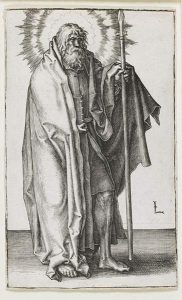 By William Mackis. © 2017.
By William Mackis. © 2017.
I’ve been thinking about wizards lately, which might seem an unlikely topic to be thinking about. Wizards are, though, archetypes, and we frequently encounter them in art, literature, and the cinema. Who can think of the Lord of the Rings trilogy without also thinking of Gandalf, the Wizard? The term has also become a convenient shorthand for describing someone who’s very good at something (“Bob is a wizard with computers”), which is perhaps why there is a professional basketball team called The Washington Wizards. But what do we really know about wizards?
Something personal prompted my investigation; a belated interest in the role of fixed stars in astrology. Books can be written about that subject, and have been, but the specific fixed star that got me thinking about wizards was Betelgeuse, which is placed in my horoscope exactly at my Midheaven. In other words, at the moment I was born, one could look up into the night sky and clearly see (very clearly, in fact, because it was during the time of a New Moon) the star Betelgeuse in the constellation Orion directly overhead.
Is that a good or bad thing? It’s not bad, as it turns out. Valerie Robson[1], in her 1923 classic Fixed Stars and Constellations in Astrology, says that Betelgeuse, “gives martial honor, preferment and wealth.” Elsbeth Ebertin[2], writing in 1928, states that with Betelgeuse at one’s Midheaven, “Preferment, luck, success and everlasting fame are promised.” Bring it, I say.
But let’s get back to wizards. An interesting article at darkstarastrology.com[3] offered the insight that, “Betelgeuse represents a process of evolving, from the young naive prince to overblown tyrant to wise wizard.” Having already gone through the naive prince phase and just now wrapping up the overblown tyrant bit – an assessment of myself with which few would argue – I found myself more than ready to embrace becoming a “wise wizard,” even if the term did include an entirely unnecessary adjective. I just didn’t know exactly what would be expected of me. So, I did some research on generally-accepted wizard attributes. Herewith, the results:
- One has to be aged. Wizards are old, or at least, in the parlance of today, mature. Young wizards aren’t usually wizards at all, but are wizard’s apprentices.
- One has to have long hair and a long beard, gray at least but more preferably white. The hairstyle in the image shown above offers a fairly good idea of what we’re looking for.
- One has to be wise, which is where the word “wizard” comes from. Or, to be very precise, “mid-15c., “philosopher, sage,” from Middle English wys “wise” (see wise (adj.)) + -ard. Cf. Lithuanian zynyste “magic,” zynys “sorcerer,” zyne “witch,” all from zinoti “to know.” The ground sense is perhaps “to know the future.” The meaning “one with magical power” did not emerge distinctly until c.1550, the distinction between philosophy and magic being blurred in the Middle Ages. As a slang word meaning “excellent” it is recorded from 1922.”[4]
- As noted immediately above, one ought to have magical power.
- One has to spend a good bit of time poring over old books, but one probably couldn’t be very wise without doing so anyway. Consequently, one has to have something of a personal library. I’m guessing an alchemical laboratory is optional, but would add a nice touch.
I’m fairly sure that I can accomplish all of the above with little difficulty. I’m aged. My hair and beard are already white, so I just have to let everything grow, which isn’t much work at all. I do have a lot of old books. Being wise is going to take some time, and having magical power even more so, but wizards are nothing if not patient.
The big issue seems to be clothing. Most wizards are represented in art as wearing long flowing garments, which really won’t work when I go to the supermarket on Saturday mornings. On the other hand, shorts and a Hawaiian shirt seem definitely non-wizardlike. I’ll have to give that question more thought. That’s okay. I really think being wizardlike is going to be great, especially after that whole overblown tyrant thing.
Notes:
1. Robson, Valerie. Fixed Stars and Constellations in Astrology. London: Cecil Palmer, 1923.
2. Ebertin, Reinhold, and Georg Hoffmann. Fixed Stars and Their Interpretation. Tempe AZ: American Federation of Astrologers, 1971. (This work is based upon Elsbeth Ebertin’s original Sternenwandel und Weltgeschehen.)
3. “Betelgeuse ~ Birthdays June 19 to 21,” Darkstar. http://darkstarastrology.com/betelgeuse/ (accessed: September 21, 2017).
4. wizard. Dictionary.com. Online Etymology Dictionary. Douglas Harper, Historian. http://www.dictionary.com/browse/wizard (accessed: September 21, 2017).
Addendum
I initially omitted to mention – perhaps due to subconsciously wanting to avoid the subject – that wizards are inevitably slim. One more thing to work on.
